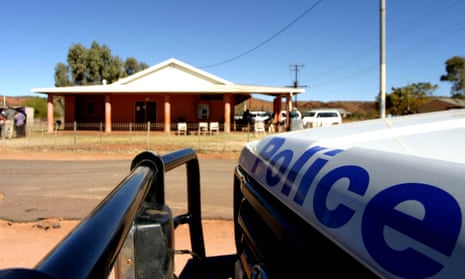A 59-year-old Indigenous man has died in police custody in Darwin in an incident an Aboriginal justice agency has said was a foreseeable result of the Northern Territory’s new “paperless arrests” powers and one the government was warned about.
The man, whose identity has not been released but who was reportedly from Alice Springs and in Darwin for medical care, died in the Darwin city watch house on Thursday night, a few hours after he was arrested for drinking in public.
NT police said the man underwent a health assessment on arrival at the watch house, but three hours later a routine cell check found him “non-responsive” and he was later confirmed dead by the watch house nurse and paramedics.
The man had been apprehended under “paperless arrest” powers introduced by the state government six months ago, which allow police to hold a person in custody for up to four hours without charge over suspected minor summary offences.
The NT’s attorney general, John Elferink, has defended the controversial police powers, saying the lack of paperwork allowed police to do their job more efficiently.
Jonathon Hunyor, principal lawyer at the North Australian Aboriginal justice agency (Naaja) said the arrest powers lacked accountability and safeguards, and had a greater impact on homeless and Aboriginal people.
Naaja has previously challenged the powers, unsuccessfully, in court and has called on the government to scrap the law.
Naaja warned the NT government the policy would lead to the incarceration of larger numbers of Aboriginal people, and a rise in the number of deaths in custody was “a concern we raised right from the outset”, said Hunyor.
“When you have a law that means more Aboriginal people will be more often in custody for longer, it immediately makes it more likely someone is going to die in custody,” he told Guardian Australia.
“That was one of the basic lessons of the royal commission into Aboriginal deaths in custody – that Aboriginal people aren’t necessarily more likely to die in custody, but they are so much more likely to be in custody and that’s why there’s such a high number of these sort of tragedies.”
He said the summary offences regime was specifically introduced so people did not have to be taken into custody and police could deal with them “in an efficient way” such as with on-the-spot fines.
“We think the paperless arrests law is a bad law. We don’t think it’s necessary. We think it makes tragedies like this more likely and the government has always known this is the case,” said Hunyor.
The attorney general told the ABC he “rejected entirely” the idea that there was a lack of accountability with paperless arrests.
“People are arrested every single day in the Northern Territory for any number of reasons, and once they come in they are looked after in exactly the same way whilst they are in the watch house,” he said.
“The average punter in the Northern Territory would like to see their police officers on the street, making sure that the streets are safe for them and their children, rather than sitting in front of computer screens typing out long-winded arrest files, which effectively aren’t necessary.”
He said the cutdown in paperwork meant rank-and-file police officers were more able to do their jobs and prevent offending.
Elferink said the government would wait for coronial inquest findings in regards to this specific case, but that it was a “sad reality that many of the people that come into the custodial environment are not in perfect health and these people will have pre-existing medical conditions, as I understand this gentleman did in this instance.”
The man’s family has been notified. NT crime command is investigating his death and will provide a report for the coroner.
